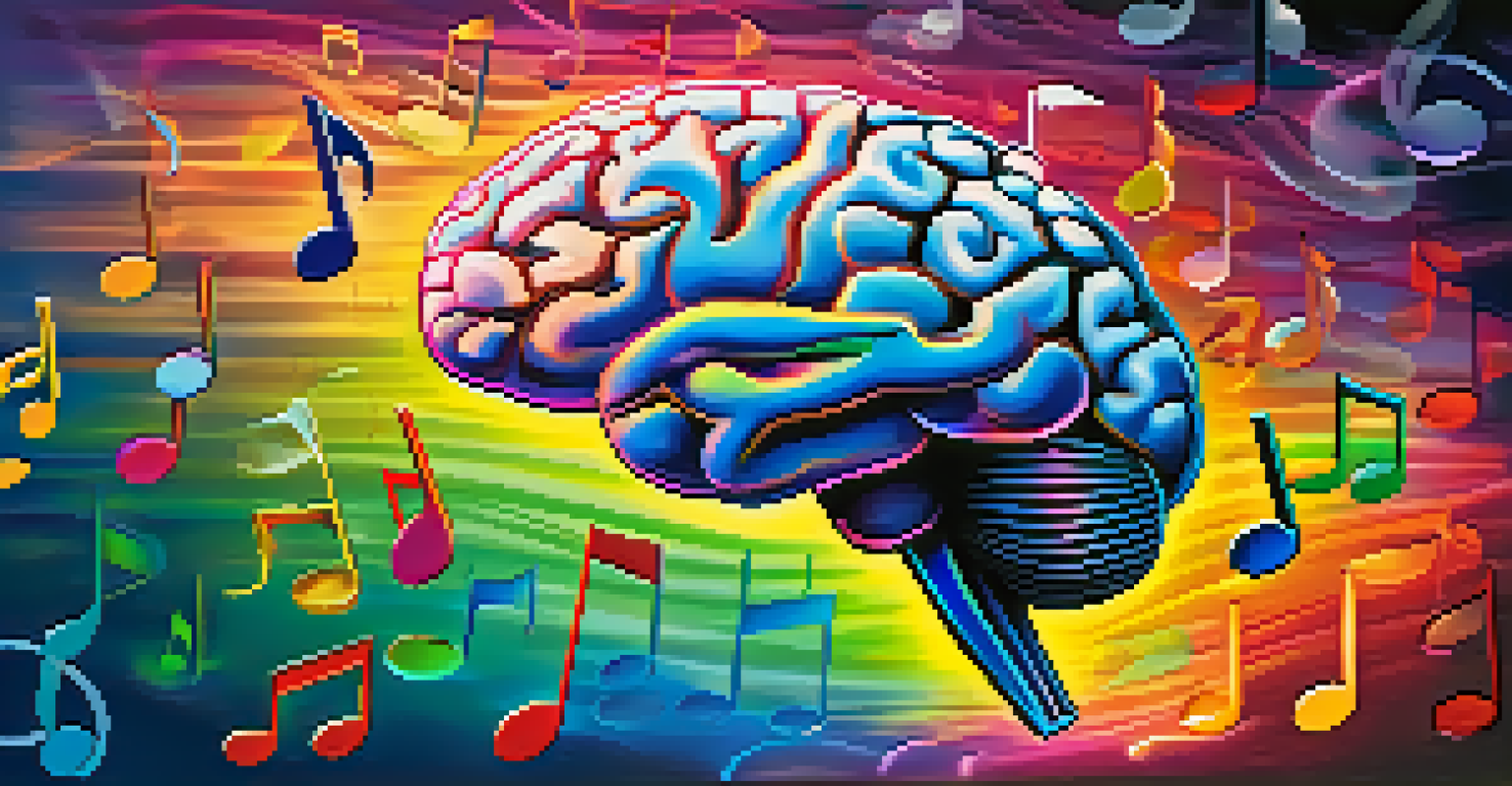Investigating the Connection Between Music and Spatial Memory

Understanding Spatial Memory and Its Importance
Spatial memory refers to our ability to remember the locations of objects, people, and landmarks. It's a crucial skill that helps us navigate our environment, whether we're walking through a city or trying to remember where we placed our keys. Good spatial memory can enhance our daily lives, making tasks like driving or finding our way around new places much easier.
Music can change the world because it can change people.
Spatial memory is not just about remembering where things are; it's also about understanding how to relate those locations to one another. For instance, when you think about your childhood home, you might visualize not only the house itself but also the pathway to the park nearby. This interconnectedness is what makes spatial memory so fascinating and essential for functioning in our world.
Research has shown that our spatial memory can be influenced by various factors, including our sensory experiences. This brings us to the intriguing question of how music, a powerful sensory experience, might impact our ability to remember spatial information.
The Role of Music in Cognitive Processes
Music has long been recognized for its ability to evoke emotions and stimulate creativity, but it also plays a role in cognitive functions like memory. When we listen to music, our brains engage in complex processes that involve memory recall and spatial awareness. This relationship suggests that music might serve as a tool to enhance our cognitive capabilities.

For example, studies have demonstrated that background music can improve performance on spatial tasks. Participants listening to music while completing memory tests often performed better than those in silence. This indicates that music might act as a cognitive enhancer, helping to create an environment conducive to better memory recall.
Music Enhances Spatial Memory
Listening to music, particularly classical and upbeat genres, can significantly improve performance on spatial memory tasks.
However, not all types of music have the same effect. The tempo, rhythm, and even genre can influence how well we perform on spatial tasks. Understanding these nuances can help us harness the power of music to boost our memory skills.
How Music Affects Brain Functioning
Listening to music activates various areas of the brain, particularly those associated with memory and spatial awareness. The auditory cortex processes sound, while the hippocampus plays a significant role in forming new memories. This overlap suggests that music can stimulate our brain's memory pathways, potentially improving our spatial memory.
The only truth is music.
Research using neuroimaging techniques has revealed that when people listen to music, their brains show increased connectivity between these regions. This heightened interaction could facilitate better memory formation and recall, particularly for spatial information. It's as if music creates a bridge between different parts of the brain, enhancing our overall cognitive functioning.
Moreover, music can help reduce stress and anxiety, which are known to impair memory. By creating a calming environment, music may allow our brains to focus better on spatial tasks, making it easier to remember where things are or how to navigate unfamiliar spaces.
Empirical Evidence Linking Music and Spatial Memory
Numerous studies have explored the connection between music and spatial memory, offering fascinating insights. One study found that participants who listened to classical music while memorizing spatial tasks performed significantly better than those in silence. This suggests that certain types of music can enhance our ability to remember spatial information.
Another experiment tested the effects of different genres of music on spatial memory tasks. Results indicated that upbeat music improved performance, while slower pieces had a neutral or negative effect. These findings highlight the importance of music selection when aiming to boost memory skills.
Brain Areas Activated by Music
Music activates regions in the brain associated with memory and spatial awareness, enhancing cognitive functioning.
Such empirical evidence reinforces the idea that music is not just background noise; it can be a powerful tool for enhancing our cognitive abilities, particularly in the realm of spatial memory.
Practical Applications: Using Music to Enhance Memory
Given the potential benefits of music on spatial memory, we can apply this knowledge in our daily lives. For instance, students studying for exams might benefit from listening to specific genres of music that enhance focus and recall. Creating a playlist tailored to the task at hand could lead to improved memory retention.
Moreover, musicians and artists can utilize this connection to enhance their creative processes. By incorporating music into their routines, they might find it easier to visualize spatial concepts or navigate complex ideas. This can be especially helpful in fields such as architecture or design, where spatial awareness is crucial.
In therapy settings, music can be employed as a tool for individuals with memory impairments, helping them recall spatial information more effectively. Tailoring music therapy sessions to include familiar tunes can trigger memories and improve cognitive functioning.
Challenges in Researching Music and Memory
While there is a growing body of research on the connection between music and spatial memory, challenges remain. One major hurdle is the variability in individual responses to music. What enhances memory for one person may not work for another, making it difficult to draw universal conclusions.
Additionally, the complexity of both music and memory poses challenges in study design. Researchers must consider factors such as genre, tempo, volume, and even personal preferences, which can all influence outcomes. This complexity can lead to mixed results in studies, complicating our understanding of the relationship.
Challenges in Music Research
Variability in individual responses to music and the complexity of factors involved complicate research on its effects on memory.
Despite these challenges, the potential benefits of further research are immense. By unraveling the intricate connection between music and memory, we can develop more effective strategies for enhancing cognitive abilities across various fields.
Future Directions: Exploring Music and Memory Further
The exploration of music's impact on spatial memory is still in its early stages, but the future looks promising. Researchers are beginning to utilize advanced technologies, such as neuroimaging and machine learning, to gain deeper insights into how music affects our cognitive functions. These innovations could lead to groundbreaking discoveries in the field of cognitive science.
Future studies may also focus on understanding how different demographics respond to music in memory tasks. For instance, do age, cultural background, or musical training influence the effectiveness of music on spatial memory? Answering these questions could lead to more personalized approaches to enhancing memory.

Ultimately, the ongoing investigation into the connection between music and spatial memory could unlock new ways to improve learning, creativity, and cognitive health for people of all ages. As we continue to explore this fascinating relationship, we may uncover strategies that can enhance our everyday lives.